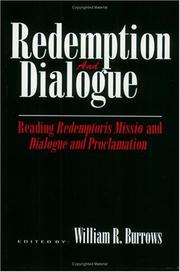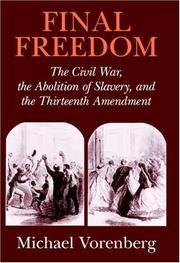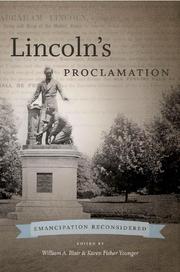| Listing 1 - 10 of 16 | << page >> |
Sort by
|

ISBN: 0883449358 Year: 1994 Publisher: Maryknoll Orbis Books
Abstract | Keywords | Export | Availability | Bookmark
 Loading...
Loading...Choose an application
- Reference Manager
- EndNote
- RefWorks (Direct export to RefWorks)
Missions --- Theory --- Catholic Church. --- Catholic Church --- Missions. --- Theory. --- Dialogue and proclamation.
Digital
Year: 1800 Publisher: [London] Published for the Society by J. Hatchard
Abstract | Keywords | Export | Availability | Bookmark
 Loading...
Loading...Choose an application
- Reference Manager
- EndNote
- RefWorks (Direct export to RefWorks)
Digital
Year: 1795 Publisher: London Printed by G. Stafford
Abstract | Keywords | Export | Availability | Bookmark
 Loading...
Loading...Choose an application
- Reference Manager
- EndNote
- RefWorks (Direct export to RefWorks)
Book
ISBN: 0821445766 9780821445761 9780821422274 0821422278 9780821422281 0821422286 Year: 2016 Publisher: Athens, Ohio
Abstract | Keywords | Export | Availability | Bookmark
 Loading...
Loading...Choose an application
- Reference Manager
- EndNote
- RefWorks (Direct export to RefWorks)
"When Lincoln took office, in March 1861, the national government had no power to touch slavery in the states where it existed. Lincoln understood this, and said as much in his first inaugural address, noting: 'I have no purpose, directly or indirectly, to interfere with the institution of slavery in the States where it exists.'".
Slaves --- Slavery --- Emancipation --- Lincoln, Abraham, --- Linkŭln, Abrakham, --- Linkolʹn, Avraam, --- Linkūln, Ibrāhīm, --- Linkan, ʼAbrehām, --- Lincoln, A. --- Lin-kʻen, --- Linken, --- Lin, Kʻen, --- Lingkʻŏn, --- Lincoln, Abe, --- Liṅkan, Ēbrāhaṃ, --- Liṅkan, Abrahāṃ, --- לינקאלין, --- לינקאלן, אייברעהעם, --- לינקולן, אברהם --- 林肯, --- Liṅkana, Ābrāhama, --- Views on slavery. --- Influence. --- United States. --- History. --- United States --- Politics and government --- Enslaved persons --- Emancipation Proclamation (United States. President (1861-1865 : Lincoln)) --- Constitution (United States) --- Living U.S. Constitution (United States) --- U.S. Constitution for everyone (United States) --- Constitution of the United States (United States) --- Foederal Constitution (United States) --- Emancipation Proclamation

ISBN: 110711750X 1280154535 0511117779 0511040520 0511153341 0511303424 0511511698 0511048297 9780511040528 0521652677 9780521652674 9780511117770 0521543843 9780521543842 9780511511691 9780511048296 9781280154539 9786610154531 6610154538 9780511303425 9780511153341 Year: 2001 Publisher: Cambridge New York Cambridge University Press
Abstract | Keywords | Export | Availability | Bookmark
 Loading...
Loading...Choose an application
- Reference Manager
- EndNote
- RefWorks (Direct export to RefWorks)
This book examines emancipation after the Emancipation Proclamation of 1863. Focusing on the making and meaning of the Thirteenth Amendment, Final Freedom looks at the struggle among legal thinkers, politicians, and ordinary Americans in the North and the border states to find a way to abolish slavery that would overcome the inadequacies of the Emancipation Proclamation. The book tells the dramatic story of the creation of a constitutional amendment and reveals an unprecedented transformation in American race relations, politics, and constitutional thought. Using a wide array of archival and published sources, Professor Vorenberg argues that the crucial consideration of emancipation occurred after, not before, the Emancipation Proclamation; that the debate over final freedom was shaped by a level of volatility in party politics underestimated by prior historians; and that the abolition of slavery by constitutional amendment represented a novel method of reform that transformed attitudes toward the Constitution.
Slaves --- African Americans --- Constitutional history --- Slavery --- Emancipation --- Civil rights --- History --- United States. --- United States --- African Americans. --- Politics and government --- Afro-Americans --- Negroes --- Lincoln, Abraham --- Civil War, 1861-1865 --- United States. Constitution. 13th Amendment --- Views on slavery --- 19th century --- United States. - President (1861-1865 : Lincoln). - Emancipation Proclamation. --- Arts and Humanities --- Enslaved persons
Digital
Year: 1643 Publisher: London Printed for N. Butter
Abstract | Keywords | Export | Availability | Bookmark
 Loading...
Loading...Choose an application
- Reference Manager
- EndNote
- RefWorks (Direct export to RefWorks)
Strafford, Bennet --- England and Wales -- Sovereign (1625-1649 : Charles I) --- England and Wales -- Sovereign (1625-1649 : Charles I) -- By the King. A proclamation prohibiting the buying or disposing of any of the lading of the ship called the Santa Clara, lately brought into Southhampton -- 1643 --- Sancta Clara (Ship) --- Pirates -- Great Britain -- Early works to 1800
Digital
Year: 1663 Publisher: London Printed by John Bill and Christopher Barker ...
Abstract | Keywords | Export | Availability | Bookmark
 Loading...
Loading...Choose an application
- Reference Manager
- EndNote
- RefWorks (Direct export to RefWorks)
Company of Merchant Adventurers of England --- England and Wales -- Sovereign (1660-1685 : Charles II) -- By the King. A proclamation for the free exportation of woollen manufactures of this kingdom, from the twentieth day of May until the five and twentieth of December next --- Wool industry -- Great Britain -- Early works to 1800

ISBN: 0807895415 9780807895412 9781469605272 1469605279 9798890884473 0807833169 9780807833162 9780807872208 0807872202 Year: 2009 Publisher: Chapel Hill
Abstract | Keywords | Export | Availability | Bookmark
 Loading...
Loading...Choose an application
- Reference Manager
- EndNote
- RefWorks (Direct export to RefWorks)
Abraham Lincoln's Emancipation Proclamation is popularly regarded as a heroic act by a great American president. Widely remembered as the document that ended slavery, the proclamation in fact freed slaves only in the rebellious South (and not in the Border States, where slavery remained legal) and, effectively, only in the parts of the South occupied by the Union. Questions persist regarding Lincoln's moral conviction and the extent to which the proclamation truly represented a radical stance on the issue of freedom. The eight distinguished contributors to this volume assess the procla
African Americans --Social conditions --19th century --Congresses. --- Border States (U.S. Civil War) --Social conditions --Congresses. --- Lincoln, Abraham, --1809-1865 --Relations with African Americans --Congresses. --- Lincoln, Abraham, --1809-1865 --Views on slavery --Congresses. --- Slaves --Emancipation --United States --Congresses. --- Southern States --Social conditions --19th century --Congresses. --- United States. --President (1861-1865 : Lincoln). --Emancipation Proclamation --Congresses. --- Slaves --- African Americans --- Emancipation --- Social conditions --- Lincoln, Abraham, --- Views on slavery --- Relations with African Americans --- United States. --- Southern States --- Border States (U.S. Civil War) --- Afro-Americans --- Black Americans --- Colored people (United States) --- Negroes --- Enslaved persons --- Linkŭln, Abrakham, --- Linkolʹn, Avraam, --- Linkūln, Ibrāhīm, --- Linkan, ʼAbrehām, --- Lincoln, A. --- Lin-kʻen, --- Linken, --- Lin, Kʻen, --- Lingkʻŏn, --- Lincoln, Abe, --- Liṅkan, Ēbrāhaṃ, --- Liṅkan, Abrahāṃ, --- לינקאלין, --- לינקאלן, אייברעהעם, --- לינקולן, אברהם --- 林肯, --- Liṅkana, Ābrāhama, --- Upper South (U.S. Civil War) --- American South --- American Southeast --- Dixie (U.S. : Region) --- Former Confederate States --- South, The --- Southeast (U.S.) --- Southeast United States --- Southeastern States --- Southern United States --- United States, Southern --- Africans --- Ethnology --- Blacks --- Persons --- Slavery --- Black people
Book
ISBN: 0691216800 0691216797 Year: 2021 Publisher: Princeton, New Jersey : Princeton University Press,
Abstract | Keywords | Export | Availability | Bookmark
 Loading...
Loading...Choose an application
- Reference Manager
- EndNote
- RefWorks (Direct export to RefWorks)
From one of our finest writers and leading environmental thinkers, a powerful book about how the land we share divides us—and how it could unite usToday, we are at a turning point as we face ecological and political crises that are rooted in conflicts over the land itself. But these problems can be solved if we draw on elements of our tradition that move us toward a new commonwealth—a community founded on the well-being of all people and the natural world. In this brief, powerful, timely, and hopeful book, Jedediah Purdy explores how we might begin to heal our fractured and contentious relationship with the land and with each other.
Political science. --- Accounting. --- Activism. --- American exceptionalism. --- Americans. --- Ammon Bundy. --- Barbarian. --- Bernie Sanders. --- By-product. --- Capitalism. --- Civil disobedience. --- Clean Water Act. --- Climate change. --- Coal mining. --- Coal. --- Colonization. --- Denialism. --- Die-in. --- Disaster. --- Disenchantment. --- Disgust. --- Dissident. --- Drinking water. --- Duke University. --- Ecological crisis. --- Employment. --- Energy development. --- Engineering. --- Environmental Defense Fund. --- Environmental issue. --- Environmental justice. --- Environmental law. --- Environmental movement. --- Environmental politics. --- Environmental stewardship. --- Environmentalism. --- Environmentalist. --- Exhaustion. --- Exit poll. --- Exoskeleton. --- Faculty of Law. --- Fuel. --- Future generation. --- Gilded Age. --- Global catastrophic risk. --- Green New Deal. --- Harvard University. --- Henry David Thoreau. --- Household. --- Human power. --- Indigenous peoples. --- Infrastructure. --- Institution. --- Interdependence. --- Labour movement. --- Lecture. --- Legislation. --- Legislator. --- Martin Luther King, Jr. --- Meriwether Lewis. --- Military occupation. --- Mining. --- Moral Mondays. --- Narrative. --- Natural disaster. --- Our Choice. --- Overburden. --- Pasture. --- Pauli Murray. --- Politics. --- Pollutant. --- Pollution. --- Princeton University Press. --- Priscilla Wald. --- Proclamation. --- Racism. --- Romanticism. --- Ruler. --- Sanctuary movement. --- Sasson. --- Slavery. --- Soil. --- Sorkin. --- Sovereignty. --- Statute. --- Surface runoff. --- Symptom. --- Ta-Nehisi Coates. --- Tax. --- Tehila. --- Theory of value (economics). --- Thomas Hobbes. --- University of Cambridge. --- Utopia. --- Value of life. --- Vulnerability. --- Wage. --- War on coal. --- Wealth. --- White supremacy. --- World government.
Book
ISBN: 1400888492 0691168946 0691196427 Year: 2017 Publisher: Princeton, NJ : Princeton University Press,
Abstract | Keywords | Export | Availability | Bookmark
 Loading...
Loading...Choose an application
- Reference Manager
- EndNote
- RefWorks (Direct export to RefWorks)
The first comprehensive political history of the communist partyVanguard of the Revolution is a sweeping history of one of the most significant political institutions of the modern world. The communist party was a revolutionary idea long before its supporters came to power. In this book, A. James McAdams argues that the rise and fall of communism can be understood only by taking into account the origins and evolution of this compelling idea. He shows how the leaders of parties in countries as diverse as the Soviet Union, China, Germany, Yugoslavia, Cuba, and North Korea adapted the original ideas of revolutionaries like Karl Marx and Vladimir Lenin to profoundly different social and cultural settings.Taking readers from the drafting of The Communist Manifesto in the 1840s to the dissolution of the Soviet Union in the early 1990s, McAdams describes the decisive role played by individual rulers in the success of their respective parties-men like Joseph Stalin, Mao Zedong, and Fidel Castro. He demonstrates how these personalities drew on vying conceptions of the party's functions to mesmerize their followers, mobilize their populations, and transform their societies. He also shows how many of these figures abused these ideas to justify incomprehensible acts of inhumanity. McAdams explains why communist parties lasted as long as they did, and why they either disappeared or ceased to be meaningful institutions by the close of the twentieth century.The first comprehensive political history of the communist party, Vanguard of the Revolution is essential reading for anyone seeking to understand world communism and the captivating idea that gave it life.
Communism --- History. --- Activism. --- Bolsheviks. --- Bourgeoisie. --- Capitalism. --- Central Committee. --- Chairman. --- Chiang Kai-shek. --- China. --- Class conflict. --- Collective leadership. --- Cominform. --- Communism. --- Communist International. --- Communist Party USA. --- Communist Party of China. --- Communist Party of Germany. --- Communist Party of the Russian Federation. --- Communist Party of the Soviet Union. --- Communist party. --- Communist state. --- Comrade. --- Counter-revolutionary. --- Criticism. --- Cultural Revolution. --- Czechoslovakia. --- Democracy. --- Democratic centralism. --- Deng Xiaoping. --- Despotism. --- Dictatorship of the proletariat. --- Dictatorship. --- Employment. --- Erich Honecker. --- Failed state. --- French Communist Party. --- Governance. --- Government. --- Grigory Zinoviev. --- Ideology. --- Imperialism. --- Institution. --- Insurrectionary anarchism. --- Joseph Stalin. --- Josip Broz Tito. --- Kuomintang. --- Labor unrest. --- Left-wing politics. --- Leninism. --- Leon Trotsky. --- Leonid Brezhnev. --- Liu Shaoqi. --- Majority. --- Manifesto. --- Mao Zedong. --- Maoism. --- Marxism. --- Marxism–Leninism. --- Mass mobilization. --- Mikhail Gorbachev. --- Nationalization. --- New Course. --- New Economic Policy. --- Nikita Khrushchev. --- Nikolai Bukharin. --- Paris Commune. --- Party discipline. --- Party leader. --- Politburo. --- Political party. --- Politician. --- Politics. --- Populism. --- Pretext. --- Proclamation. --- Proletarian revolution. --- Protest. --- Rebellion. --- Reformism. --- Regime. --- Representative democracy. --- Revolution. --- Revolutionary movement. --- Self-determination. --- Social democracy. --- Socialist state. --- Sovereignty. --- Soviet Union. --- Soviet people. --- Stalinism. --- Strike action. --- Supporter. --- The Communist Manifesto. --- Trade union. --- Unintended consequences. --- Vanguardism. --- Voting. --- War. --- Working class. --- Yugoslavia. --- Zhou Enlai.
| Listing 1 - 10 of 16 | << page >> |
Sort by
|

 Search
Search Feedback
Feedback About UniCat
About UniCat  Help
Help News
News